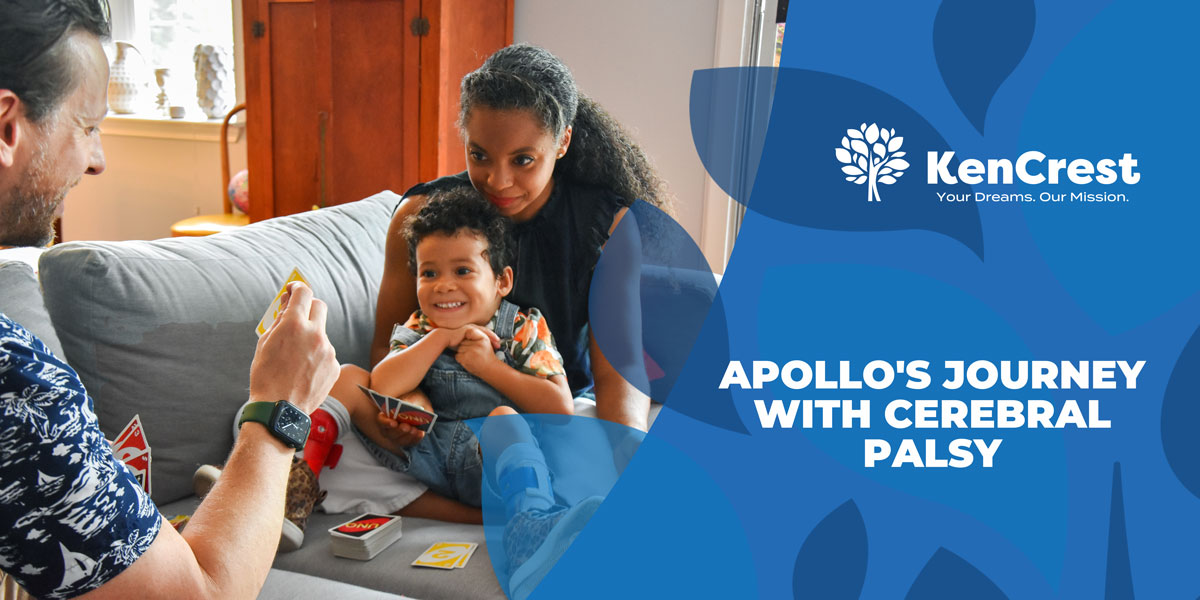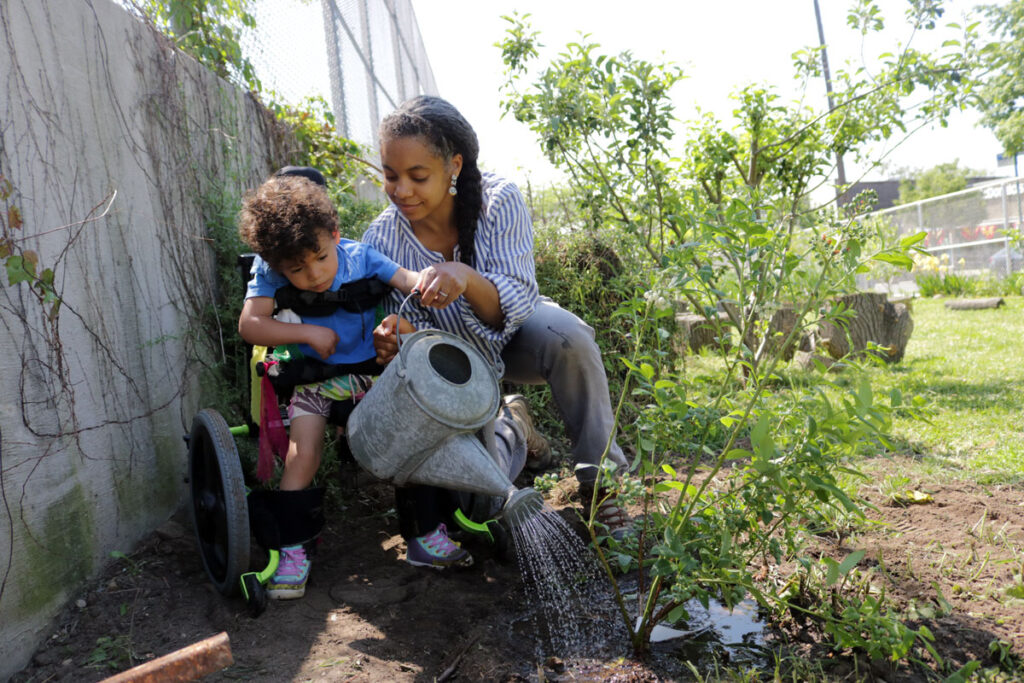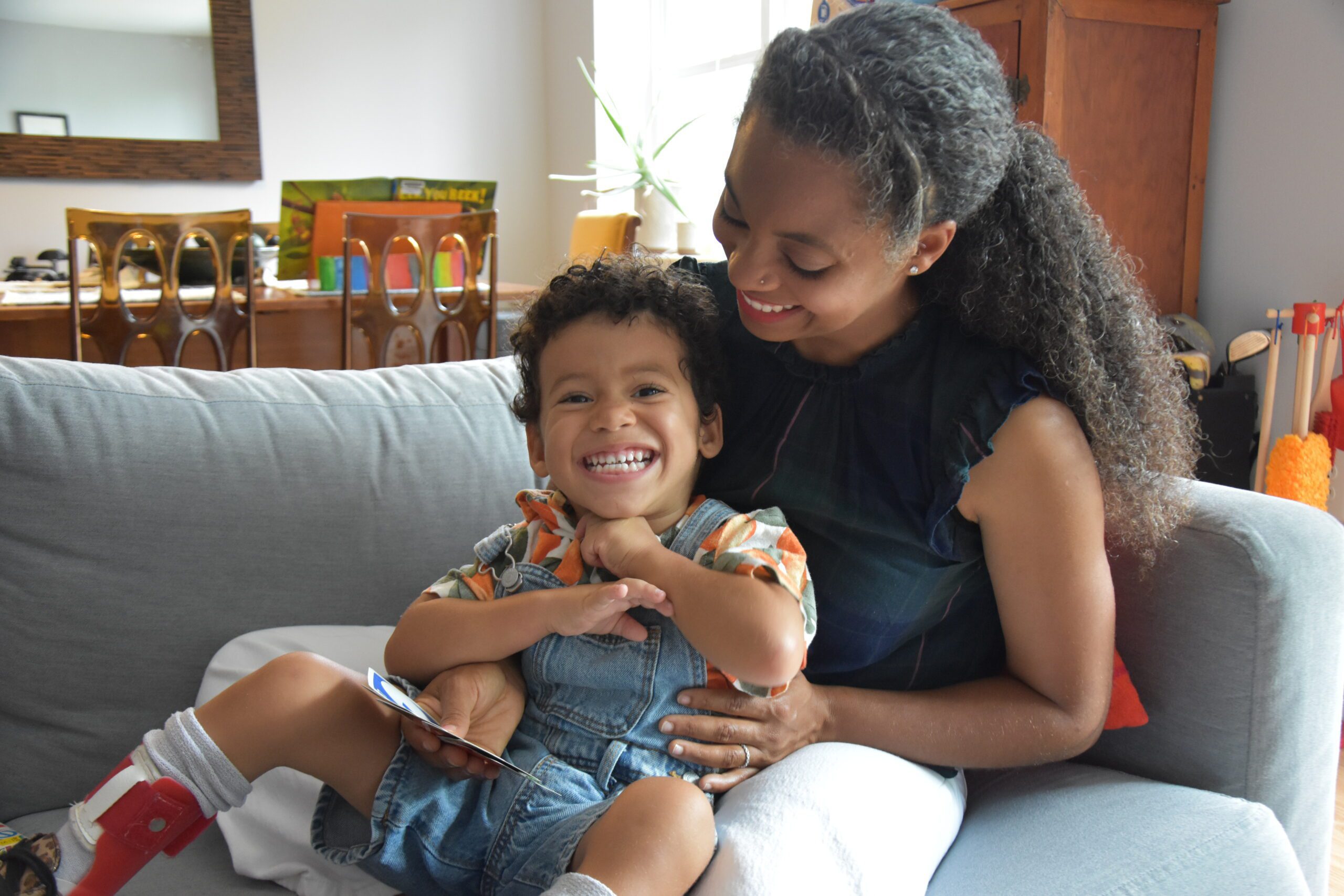Apollo’s Journey With Cerebral Palsy

At three-years-old Apollo and his parents, Sana and Zach, navigate Spastic Quad Cerebral Palsy with help from KenCrest’s Early Intervention team.
By Sydney Kerelo
On a sunny Monday afternoon at an Ardmore apartment complex resembling the White House, one three-year-old, Apollo, wheels into his living room with a brilliant smile. Arriving home from preschool, sweaty and happy, Apollo beams at his parents while recounting his day.
Two years ago, the family moved back to the Philadelphia area from New York with hopes of finding the best medical support for Apollo, who, at only nine months old, was diagnosed with Spastic Quadriplegia Cerebral Palsy (CP)—a form of CP that varies from mild stiffness to severe pain or paralysis, and uncontrollable muscle spasms in both arms and legs.
At four months old, Apollo began showing symptoms of CP when he started having seizures. A month later, he underwent testing during an overnight hospital visit. They performed an electroencephalogram or EEG and analyzed him for months while witnessing his motor milestones regress and weight plateau, finally diagnosing him with CP. They referred him to an Early Intervention provider in New York, where they lived before the family moved to Ardmore when Apollo was 20 months old. He was later referred to KenCrest, receiving physical, occupational, speech, and special instruction through Early Intervention.
At 11 months old, Apollo began using orthotics and learned how to use a gait trainer at two and a half years old. This device helps children walk properly, maintain momentum, build muscle skills, and become more accustomed to orthotic devices. Since he began using it, Apollo’s head and torso control have improved significantly.
“I’m naturally optimist but when Apollo was first hospitalized, everything went black. It was tough to pull myself out of that but one day I realized that I wouldn’t to wait any longer to be happy. I just decided to be happy, no more wallowing, I would return to living in the light. At that time, I also made a deliberate decision that I wouldn’t talk about Apollo by leading with the medical stuff. I would talk to people about who he is as a person.”
Since his diagnosis, Apollo’s parents, Sana and Zach, constantly advocate for him to live an inclusive life. They consistently take him out into the community, play games with him, and involve him in all manners of their lives, including gardening. As an avid gardener, Sana rents a plot of land at her local community garden, growing various vegetables and plants. She brings Apollo to the garden and sits with him either between her knees or on her lap to do hand-over-hand with him as she teaches him how to garden.

Sana and Apollo gardening together. // Photo courtesy of Sana Garner
They use the hand-over-hand method for everything, including playing Uno together as a family. “My husband and I are just playing like we’re three years old all the time with him,” she laughs. Apollo even loves to play what he calls “classical music” on his toy piano and sing along to cheerful tunes.
For weeks, he was obsessed with Frozen and would sing all the songs at the breakfast table. His parents would even freeze cups of ice for him to chisel at as the ice choppers in the movie do.
Before Apollo graduated from KenCrest’s Early Intervention program, he worked closely with physical, occupational, and speech therapists to learn how to move his body and use mobility assistive devices like the gait trainer. His special instructor worked with him to learn to play with his classmates and advocate for his needs.
RELATED: Cultivating a Community For Families with Disabilities
“He goes to a mainstream preschool, and so he’s the only kid who doesn’t have full motor use of his body,” says Apollo’s mother, Sana Garner. “So, with a special instructor, it was important for us always to maintain his self-esteem and appreciate the good things about him. We wanted someone to help him navigate that mainstream school environment, and our special instructor from KenCrest helped us do that.”
“And since he’s been receiving therapy, he’s grown a ton,” she adds. “He now has the ability to open and close his hands deliberately; we even have a video of him doing ‘Twinkle Twinkle Little Star.’”
Since the family moved back to the Philadelphia area more than two years ago, they found better access to medical support but needed a community environment. They noticed that whenever they went to the playground with Apollo, there was never anyone with disabilities like him present. And they wanted to change that. So, Sana started Creative Movers, a monthly playgroup for kids with motor differences and medical complexities—that allows children with disabilities to play freely with one another and parents to connect with each other.

Apollo and Sana are playing Uno together. // Photo by Sydney Kerelo
“Apollo recently got to play with a little girl his exact age, who also uses a gait trainer, for the first time,” exclaims Sana. “He now sees other kids in wheelchairs and those who transitioned from a gait trainer to a walker, which is amazing.”
“We support our kids by maximizing their lives and letting them be kids,” adds Sana. “Our children have so much structured activity that it's so precious when they can play unstructured, and we want to create an environment where they can do that.”
The playgroup has anywhere from four to seven families attending each month, and various playground locations like Freedom Playground in Haverford or CADES Inclusive Playground and Music Garden in Swarthmore, a new accessible playground that’s designed for people using mobility aids to play together.
According to Sana, one family recently emboldened by the playgroup brought their child’s gait trainer to the park for the first time because they finally felt like they had a safe space to bring it.
“It’s been amazing to see the webs of community that are happening now and our playgroup being a part of it,” Sana says. “We got really lucky with our support system at KenCrest; we had such a great team that felt like a cooperative, collaborative group and set us up on the right foot.”
